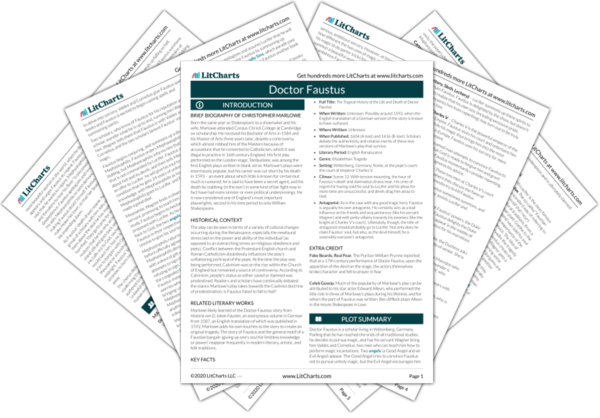Summary
Analysis
In the B-text, two men at the court of emperor Charles V, named Martino and Frederick, discuss Bruno's escape from the pope and the now-famous Doctor Faustus. A knight named Benvolio arrives. He is not impressed by Faustus' devil-inspired conjuring and says that he will not go to court to see Faustus. This entire scene is not in the A-text at all.
In this B-text scene, Martino and Frederick are evidence of Faustus' meteoric rise to fame, while Benvolio (simply an unnamed knight in the A-text) offers a critical point of view on Faustus' sinful magic.
Themes
At the court of the emperor, Charles V eagerly asks Faustus to prove his skills in magic by performing a spell, though a knight (the same character as Benvolio in the B-text) at court is skeptical of Faustus. Faustus agrees and the emperor asks him to bring forth the spirit of Alexander the Great, since the emperor greatly admires the famous conqueror.
Faustus employs his magic not for lofty goals but for petty parlor tricks. The knight, much like the scholars from earlier, is critical of Faustus' sinful turn to demonic magic.
Themes
Quiz
Test Yourself
The skeptical knight doesn't believe that Faustus can bring Alexander forth, and leaves, not wanting to be present for the conjuring. Faustus has Mephastophilis leave and return with the spirits of Alexander and Alexander's paramour. The emperor examines the spirits and remarks that he thinks they are the true bodies of Alexander and his lover. (In the B-text, Alexander appears with his rival Darius, king of Persia, whom he then defeats.)
Alexander represents the epitome of a powerful individual. Faustus too has achieved much power through his magic, but again there is a disconnect between the grandness of his original ambition to become a king (much like Alexander the Great) and his behavior here as a mere court entertainer. Perhaps fulfilling his wildest desires has made Faustus stop desiring things and has thus robbed him of ambition.
Themes
Quiz
Test Yourself
The spirits leave, and Faustus asks for the emperor to call the skeptical knight back to court. The knight re-enters and now has horns on his head, the result of a curse from Faustus in return for his rudeness. The emperor asks Faustus to take the horns away; Faustus relents. The emperor promises Faustus a reward for his display of magic, before leaving. Faustus tells Mephastophilis that he wants to return to Wittenberg.
Faustus continues to play tricks through his magic. His indulgence in sin seems to have deteriorated his character as a respectable scholar.
Themes
Quiz
Test Yourself
Get the entire Doctor Faustus LitChart as a printable PDF.

In the B-text, after Faustus leaves, Martino and Frederick re-enter with Benvolio. Irritated by Faustus' prank, Benvolio plots to kill Faustus. Martino and Frederick reluctantly agree to help. They hide to ambush Faustus, unaware that he has a false (prosthetic) head to trick them. Benvolio decapitates Faustus and celebrates his victory. The three men plan to disfigure the head, when they realize that Faustus is still alive. Faustus sends devils to punish Benvolio, Frederick, and Martino for their attempted ambush, tormenting them and putting horns on all their heads. Again, none of this occurs in the A-text.
This B-text addition further emphasizes themes already in the A-text version: the knight's disapproval of Faustus and Faustus' great power but cheap application of it. Sinning seems to have made Faustus a more wicked character, driven more by basic desires for revenge and entertainment than by a quest for knowledge.
Themes












